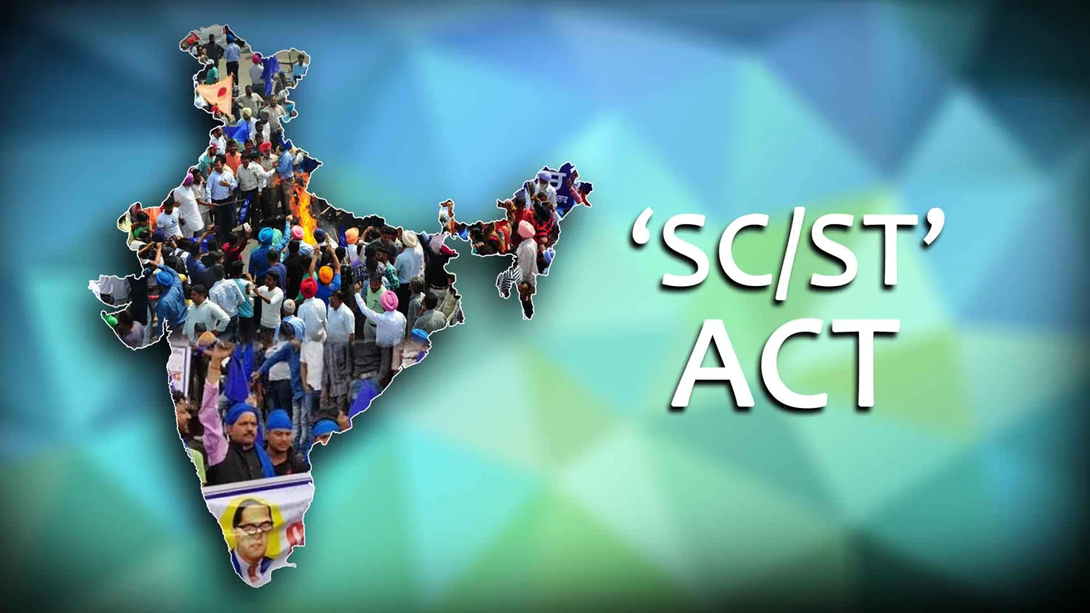- Courses
- GS Full Course 1 Year
- GS Full Course 2 Year
- GS Full Course 3 Year
- GS Full Course Till Selection
- Answer Alpha: Mains 2025 Mentorship
- MEP (Mains Enrichment Programme) Data, Facts
- Essay Target – 150+ Marks
- Online Program
- GS Recorded Course
- Polity
- Geography
- Economy
- Ancient, Medieval and Art & Culture AMAC
- Modern India, Post Independence & World History
- Environment
- Governance
- Science & Technology
- International Relations and Internal Security
- Disaster Management
- Ethics
- NCERT Current Affairs
- Indian Society and Social Issue
- NCERT- Science and Technology
- NCERT - Geography
- NCERT - Ancient History
- NCERT- World History
- NCERT Modern History
- CSAT
- 5 LAYERED ARJUNA Mentorship
- Public Administration Optional
- ABOUT US
- OUR TOPPERS
- TEST SERIES
- FREE STUDY MATERIAL
- VIDEOS
- CONTACT US
Not every ‘insult’ against SC/ST can be considered as offence
Not every ‘insult’ against SC/ST can be considered as offence

The Supreme Court recently ruled on a significant issue concerning the Scheduled Castes and Scheduled Tribes (Prevention of Atrocities) Act, 1989 (SC/ST Act). The ruling addresses whether mere insults or intimidations directed at individuals from SC or ST communities automatically qualify as offenses under the SC/ST Act.
- This judgment emerged in the context of an anticipatory bail application by a YouTube channel editor accused under the SC/ST Act for derogatory remarks about a SC MLA.
Key Aspects of the Supreme Court Ruling
1. Case Background:
- Allegations: The YouTube editor was accused of making derogatory remarks against a SC MLA.
- Issue: Whether such remarks constitute an offense under the SC/ST Act.
2. SC Ruling:
- Scope of the Act: The Court clarified that insults or intimidations directed at SCs or STs do not automatically fall under the SC/ST Act.
- Link to Caste Identity: For an offense to be recognized under the Act, the insult or intimidation must specifically target the caste identity of the victim.
- Interpretation of 'Intent to Humiliate': Under Section 3(1)(r), 'intent to humiliate' must be closely tied to the victim's caste identity. Knowing the victim's SC/ST status is not sufficient; the intent must be to humiliate based on caste.
- Clarification on Section 18: The Court noted that Section 18 of the Act, which traditionally bars anticipatory bail, does not preclude the granting of such bail entirely. A preliminary inquiry is required to determine if the allegations meet the Act’s criteria.
- Decision on Bail: The Court granted anticipatory bail to the editor, finding no prima facie evidence of caste-based humiliation.
About the Scheduled Castes and Scheduled Tribes (Prevention of Atrocities) Act, 19891. Purpose and Background:
2. Key Provisions:
3. Recent Amendments:
|
Drawbacks of the SC/ST Act, 1989:
1. In adequate Resources:
- Special Courts: Often lack sufficient resources, leading to case backlogs and delays.
2. Insufficient Rehabilitation:
- Support Measures: Limited focus on comprehensive victim rehabilitation beyond economic and social support.
3. Lack of Awareness:
- Beneficiaries and Officials: Limited awareness among victims and law enforcement about the Act’s provisions.
4. Misuse and Scope:
- Allegations of Misuse: The broad scope can lead to false accusations and misuse.
- Coverage of Crimes: Certain crimes, such as blackmailing leading to atrocities, are not explicitly covered.
Judicial Insights:
1. Kanubhai M. Parmar v. State of Gujarat, 2000: Act does not apply to crimes between SCs or STs; meant to protect from atrocities by non-SCs/STs.
2. Raj Mal v. Ratan Singh, 1988: Special Courts under the Act are exclusive for such offenses, not to be confused with regular courts.
3. Arumugam Servai v. State of Tamil Nadu, 2011: Insulting a SC/ST member constitutes an offense under the Act.
4. Subhash Kashinath Mahajan v. State of Maharashtra and Others, 2018: Section 18 does not absolutely bar anticipatory bail; courts can grant it in certain cases.
Conclusion
The Supreme Court's recent ruling on the SC/ST Act clarifies that not every insult or threat against SCs or STs qualifies as an offense under the Act. The Court emphasizes applying the law carefully to prevent misuse while addressing genuine caste-based discrimination. It stresses the need for effective implementation, including functioning special courts and protection cells, and calls for ongoing review and reform to ensure the Act is just and effective.
Must Check: Best IAS Coaching In Delhi
UPSC Prelims Result 2024 Out: Expected Cut Off & Other Details, UPSC Prelims 2024 Answer with Explanation, Daily Prelims Quiz, Daily Current Affairs, MONTHLY CURRENT AFFAIRS TOTAL (CAT) MAGAZINE, Best IAS Coaching Institute in Karol Bagh, Best IAS Coaching Institute in Delhi, Daily Mains Question Answer Practice, ENSURE IAS UPSC Toppers, UPSC Toppers Marksheet, Previous Year Interview Questions, UPSC Syllabus




